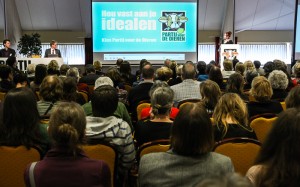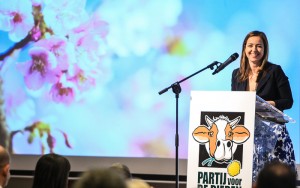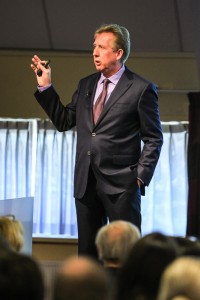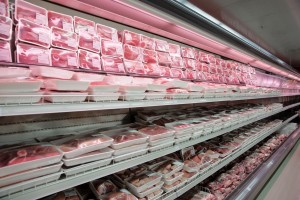Worldlog Semena 16 – 2013
No domingo dia 7 de abril tivemos novamente um congresso muito reconfortante em Doorn com uma assistência enorme. Entre outros, houve um discurso maravilhoso do professor universitário Jan Rotmans. Ele citou o Herman Verhagen: Nós não vivemos numa era de mudanças mas numa mudança de eras. Uma frase muito cativante!
Eu fiz perguntas parlamentares sobre a presença de animais domésticos em alimentos e em forragem. Na semana passada apareceu no jornal holandês NRC um artigo abordando o fato que na Espanha são incorporados cães vadios, animais selvagens atropelados e animais domésticos em produtos que são vendidos entre outros como matéria-prima para forragem. A possibilidade existe que essa forragem também foi fornecida a empresas holandesas. Ademais se suspeita que uma empresa holandesa está envolvida nesse negócio. Quanto a nós essa empresa deve perder a sua licença imediatamente.
E mais um escândalo de carne de uma enormidade sem precedentes. Desde 2011 nada menos que 50 milhões de quilos de carne suspeita foi incorporada em pizzas, latas de conservas e comidas prontas para comer! A indústria alimentar fala sobre centenas de milhões de refeições contendo carne suspeita. A Autoridade de Segurança Alimentar e de Bens de Consumo da Holanda (NVWA) diz que só agora descobriu isso.
A causa de todos esses escândalos de carne tem a ver com uma série de fatos: a industria alimentar se dirige à carne mais barata possível, o controlo é praticamente inexistente porque as autoridades deixam os açougueiros inspeccionar a própria carne por meio da auto-regulação e nos últimos anos se economizou muito na vigilância que deveria ser exercida pela NVWA. E isso à custa dos seres humanos e dos animais. A NVWA deveria funcionar muito melhor para poder descobrir esse tipo de praticas fraudulentas! Na quinta-feira passada eu requeri um debate que provavelmente vai ter lugar na semana que vem. O Partido para os Animais quer que a NVWA imediatamente torne pública a lista de empresas que compraram a carne suspeita assim que os consumidores possam se proteger. Até agora ela se nega a fazer isso. A NVWA diz não ter indícios de que a carne forme um perigo para a saúde pública mas ao mesmo tempo diz não ter a menor ideia sobre a proveniência da carne. Desse jeito, tranquilizando as pessoas enganosamente a NVWA obviamente se torna completamente inverosímil. Infelizmente o nosso pedido para a publicação imediata da lista de empresas não teve o apoio na Câmara Baixa dos partidos tradicionais como o Partido do Trabalho (PvdA), o Partido Popular para Liberdade e Democracia (VVD), Democratas 66 (D66) e o Apelo Democrático Cristão (CDA). O VVD e o CDA alegaram não sentir qualquer necessidade para um debate. A Secretária de Estado para os Assuntos Económicos deve reagir ao meu pedido antes de terça-feira que vem.
Também a França se entusiasma pela ideia que devemos fazer uma transição de proteínas animais para proteínas vegetais. Que bom! Mais novas da França: houve uma resenha maravilhosa no Huffington Post francês a propósito do lançamento do livro Meat the Truth há duas semanas em Paris.
Até a semana que vem!
On Sunday, April 7 we had a heart-warming party conference in Doorn with a huge turnout. We enjoyed such things as a fantastic speech by professor Jan Rotmans in which he quoted Herman Verhagen: We do not live in an era of change but in a change of eras. A very catchy statement!
I asked parliamentary questions about pets being found in food and cattle feed. Last week, a Dutch newspaper called NRC contained an article that touched on how in Spain, unwanted dogs, wild animals that have been hit by cars, and pets are being processed into products that are sold as such things as raw material for animal feed. It’s very possible that this feed is being supplied to Dutch businesses. A Dutch business is also suspected of being involved. As far as we’re concerned, this business should immediately lose their licence.
And yet another meat scandal of unprecedented scale. At least 50 million kilograms of suspicious meat have been added to pizzas, cans, and ready-to-eat meals since 2011! The foodstuff industry says hundreds of millions of meals have had suspicious meat included. The Dutch Food and Consumer Product Safety Authority (NVWA) say they’ve only just found out about this.
All these meat scandals are down to the fact that the food industry focuses on making meat as cheap as possible. Very few checks are performed because the government itself gives the seal of approval – which is self-regulation – and they have made considerable cuts to the NVWA’s supervision these past few years. And it is both animals and humans that pay. The NVWA needs to be able to function on a much higher level in order to be able to detect these types of fraudulent practices!
Last Thursday, I asked for a debate, which will probably take place next week. The Party for the Animals wants the NVWA to immediately publish the list of businesses to which the meat was sold, so consumers can protect themselves. They have refused to do so up to this point. The NVWA says there are no indicators that the meat poses a threat to public health, but at the same time says they absolutely do not know where the meat comes from. The NVWA are doing themselves no favours with these false reassurances. Unfortunately, we in the Lower House have received no support from the traditional parties of the Dutch Labour Party (PvdA), the People’s Party for Freedom and Democracy (VVD), D66, and the Christian Democratic Alliance (CDA) for making the list public as quickly as possible. The VVD and the CDA said they had no need of a debate. The State Secretary of Economic Affairs must now react to our request before this Tuesday.
France is warming up to the idea that we need to switch from animal to vegetable proteins. Wonderful! More news from France: there was a great review in the French Huffington Post as a result of our Meat the Truth book presentation two weeks ago in Paris.
See you next week!



